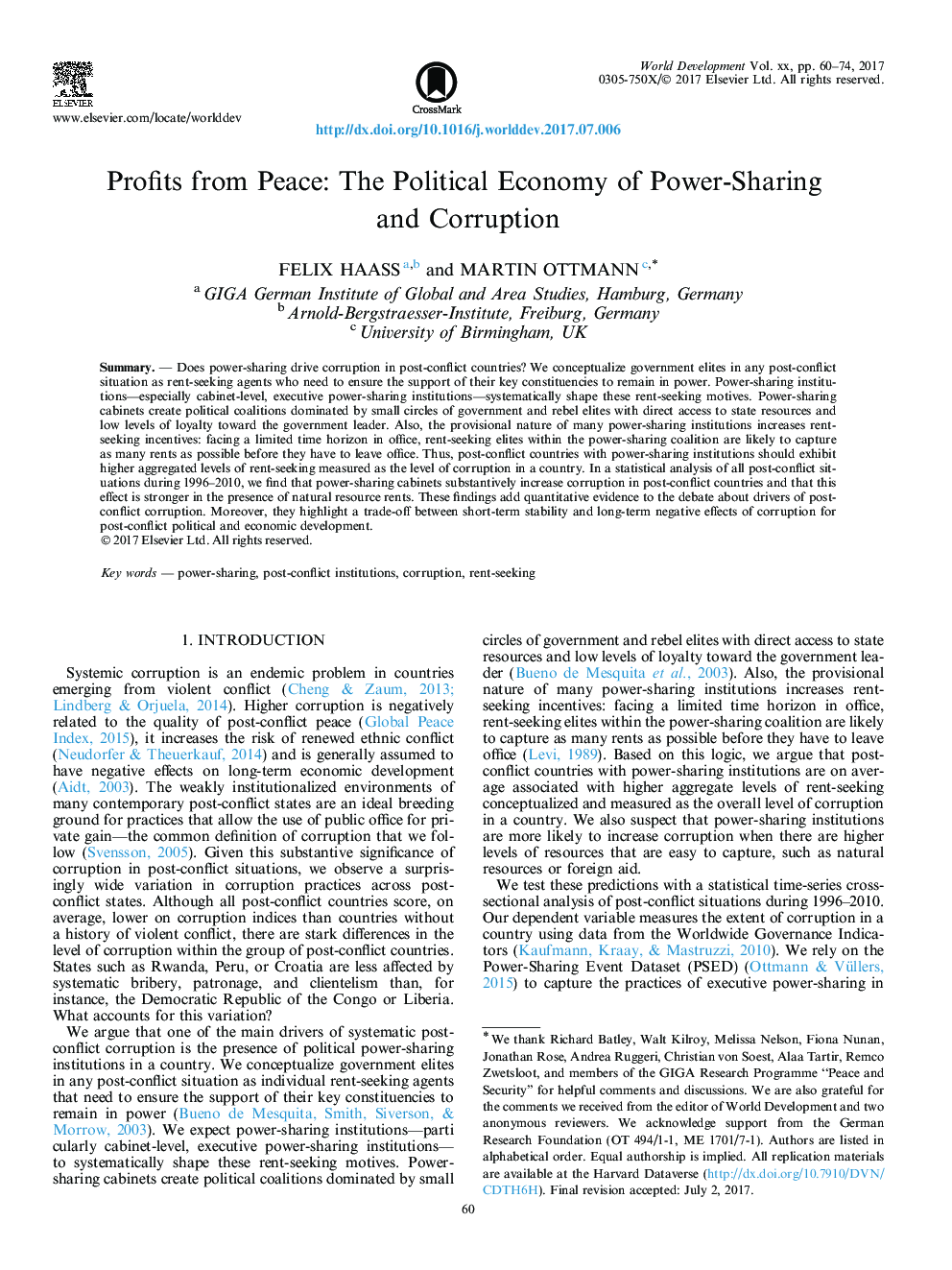| کد مقاله | کد نشریه | سال انتشار | مقاله انگلیسی | نسخه تمام متن |
|---|---|---|---|---|
| 5105091 | 1481119 | 2017 | 15 صفحه PDF | دانلود رایگان |
عنوان انگلیسی مقاله ISI
Profits from Peace: The Political Economy of Power-Sharing and Corruption
ترجمه فارسی عنوان
سود از صلح: اقتصاد سیاسی از قدرت اشتراک و فساد
دانلود مقاله + سفارش ترجمه
دانلود مقاله ISI انگلیسی
رایگان برای ایرانیان
کلمات کلیدی
تقسیم قدرت، موسسات پس از جنگ، فساد، اجاره یابی،
ترجمه چکیده
آیا فساد در اختیار قدرت در کشورهای پس از جنگ قرار دارد؟ ما نخبگان دولتی را در هر وضعیت پس از بحران به عنوان عوامل ارجاعی که نیاز به حمایت از حوزه های کلیدی اصلی خود برای حفظ قدرت دارند، در نظر می گیریم. موسسات به اشتراک گذاشتن قدرت - به ویژه در سطح کابینه و نهادهای اجرایی قدرت - به طور سیستماتیک این انگیزه های اجاره ای را شکل می دهند. هیئت های قدرت به ایجاد ائتلاف های سیاسی تحت سلطه محافل کوچک دولت و نخبگان شورشی با دسترسی مستقیم به منابع دولتی و پایین وفاداری نسبت به رهبر دولت می پردازند. همچنین ماهیت موقت بسیاری از نهادهای قدرتمند افزایش انگیزه های اجاره ای را افزایش می دهد: نخبگان به دنبال اجاره بها در ائتلاف با تقسیم قدرت به احتمال زیاد می توانند قبل از اینکه مجبور شوند دفتر را ترک کنند . بنابراین، کشورهای پس از جنگ با موسساتی که قدرت را در اختیار دارند، باید سطوح بالاتری از اجاره بها را به عنوان سطح فساد در یک کشور نشان دهند. در تجزیه و تحلیل آماری تمام شرایط پس از جنگ در طول سالهای 1996 تا 2010، ما دریافتیم که کابینه های اشتراک قدرت به طور قابل توجهی فساد را در کشورهای پس از جنگ افزایش می دهند و این تاثیر در حضور اجاره های منابع طبیعی قوی تر است. این یافته ها شواهد کمی را به بحث در مورد رانندگان فساد پس از جنگ اضافه می کند. علاوه بر این، آنها بر همگرایی بین ثبات کوتاه مدت و اثرات منفی فساد بلند مدت برای توسعه سیاسی و اقتصادی پس از جنگ تأکید می کنند.
موضوعات مرتبط
علوم انسانی و اجتماعی
اقتصاد، اقتصادسنجی و امور مالی
اقتصاد و اقتصادسنجی
چکیده انگلیسی
Does power-sharing drive corruption in post-conflict countries? We conceptualize government elites in any post-conflict situation as rent-seeking agents who need to ensure the support of their key constituencies to remain in power. Power-sharing institutions-especially cabinet-level, executive power-sharing institutions-systematically shape these rent-seeking motives. Power-sharing cabinets create political coalitions dominated by small circles of government and rebel elites with direct access to state resources and low levels of loyalty toward the government leader. Also, the provisional nature of many power-sharing institutions increases rent-seeking incentives: facing a limited time horizon in office, rent-seeking elites within the power-sharing coalition are likely to capture as many rents as possible before they have to leave office. Thus, post-conflict countries with power-sharing institutions should exhibit higher aggregated levels of rent-seeking measured as the level of corruption in a country. In a statistical analysis of all post-conflict situations during 1996-2010, we find that power-sharing cabinets substantively increase corruption in post-conflict countries and that this effect is stronger in the presence of natural resource rents. These findings add quantitative evidence to the debate about drivers of post-conflict corruption. Moreover, they highlight a trade-off between short-term stability and long-term negative effects of corruption for post-conflict political and economic development.
ناشر
Database: Elsevier - ScienceDirect (ساینس دایرکت)
Journal: World Development - Volume 99, November 2017, Pages 60-74
Journal: World Development - Volume 99, November 2017, Pages 60-74
نویسندگان
Felix Haass, Martin Ottmann,
